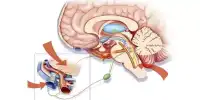An imbalance in the sex hormones in those with ovaries is what leads to PCOS. One of the most prevalent causes of female infertility, it affects 6–12% of US women of reproductive age.
The female reproductive system includes the uterus, vagina, fallopian tubes, and ovaries. Immature eggs are kept in follicles, which are small fluid-filled organs, in the ovaries. The brain produces carefully regulated hormones that have an impact on the ovaries.
Follicle-stimulating hormone (FSH) and luteinizing hormone (LH) are released into the bloodstream early in the menstrual cycle and rush to the ovaries. This is the cue for the ovaries to begin generating some immature eggs, and the follicles begin to grow as a result.
The ovaries secrete estrogen throughout during egg maturation. The brain sends LH to the ovaries when this estrogen reaches a particular amount, which stimulates the follicle to open and release an egg. FSH production then stops. Ovulation is the name given to this process.
The egg will then proceed happily down the fallopian tube and wait for sperm cell fertilization. The lining of the uterus is shed if the egg is not fertilized; this can frequently feel like the uterus is punishing you. It’s possible that the extreme hormonal fluctuations will make you cry at Mufasa’s passing in The Lion King, have a huge chocolate craving, bleed vaginally, and feel excruciating cramps.
This hormonal dance is out of whack in those with PCOS because high blood levels of LH can prevent the maturation of follicles and prevent ovulation. Sometimes the immature follicles do not disappear again and can develop cysts, which are fluid-filled sacs.
If your goal is to become pregnant, the ovulation disruption may make this goal challenging to achieve.
Causes PCOS: Unknown is the true etiology of PCOS. Nevertheless, there have been some advances in recent years. According to one study, prenatal exposure to the growth hormone anti-Müllerian hormone (AMH) may increase the risk of PCOS later in life.
As children of parents with PCOS may have a higher risk of illness, it may also be inherited.
Coming off hormonal birth control can occasionally result in symptoms similar to PCOS:
The regular menstrual cycle may take some time to reestablish itself after stopping the Pill. It is not unusual and typically not cause for concern to last up to six months. On the other hand, signs of elevated androgen levels shouldn’t exist in a person without PCOS or a comparable underlying condition, according to Associate Professor Alex Polyakov, a senior gynecologist, and expert in fertility at Melbourne University.
In order to rule out PCOS and other disorders that may masquerade as PCOS (such as thyroid dysfunction, elevated prolactin levels, and many others), the occurrence of such symptoms should trigger further testing and examination.
















